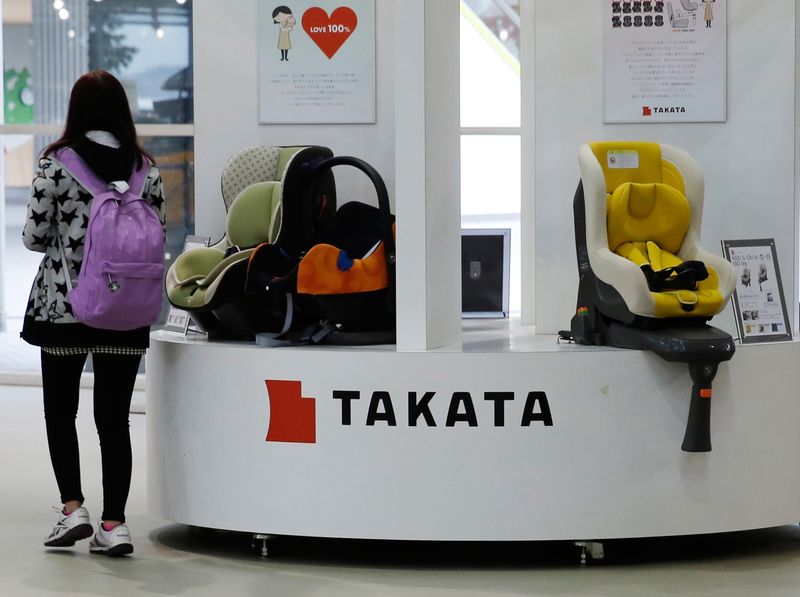By David Morgan and Ben Klayman
WASHINGTON/DETROIT (Reuters) - Japanese air bag manufacturer Takata Corp (T:7312) is doubling a recall of potentially deadly air bags to nearly 34 million vehicles, making it the largest automotive recall in American history, U.S. safety regulators said on Tuesday.
The recall involves passenger and driver-side air bag inflators in vehicles made by 11 automakers, the U.S. Department of Transportation, the National Highway Traffic Safety Administration (NHTSA) and Takata said. It expands on the 16.6 million vehicles called back for repairs for the same issue in previous regional and national recalls, and boosts the number of vehicles affected globally since 2008 to more than 53 million.
Regulators on Tuesday linked six deaths worldwide to defective Takata air bags which exploded too violently and shot shrapnel into the vehicles.
Takata CEO Shigehisa Takada said in a statement: "We are pleased to have reached this agreement with NHTSA, which represents a clear path forward." The company declined to say whether markets outside the United States would be affected.
It was only under pressure from U.S. regulators that Takata agreed to the expanded recall. It had previously resisted expanding the recalls, saying the defect cited by automakers was not "officially recognized."
Toyota Motor Corp (T:7203), Nissan Motor Co (T:7201) and Honda Motor Co (T:7267) had expanded their Takata recalls over the past week.
The automakers have said they decided to proceed with their recalls after finding some Takata air bag inflators were not sealed properly, allowing moisture to seep in to the propellant casing. Moisture damages the propellant and can lead to an inflator exploding with too much force.
The six deaths linked to the defective air bags have all been in cars made by Honda, which has borne the brunt of the Takata recalls to date. Honda gave a disappointing profit forecast last month due to higher costs related to quality fixes.
Takata shares fell by as much as 12 percent to their lowest in more than a month in Tokyo on Wednesday, and traded 9.7 percent lower in the afternoon. Honda shares were flat.
U.S. Transportation Secretary Anthony Foxx said NHTSA also issued a consent order to Takata, requiring the supplier to cooperate in the safety agency's probe as well as any oversight.
NHTSA also said it will "organize and prioritize the replacement of defective Takata inflators" under its legal authority. This is the first time the agency has used this power since 2000, when Congress granted it under the TREAD Act.
"We will not stop our work until every air bag is replaced," Foxx said.
'OWNING UP TO THE CRISIS'
Foxx and NHTSA's new administrator, Mark Rosekind, have been aggressive in tackling auto safety issues. On Monday, NHTSA escalated a regulatory battle with Fiat Chrysler (NYSE:FCAU) Automobiles (MI:FCHA), saying it could impose "multiple penalties" on the automaker and order a public hearing to examine the automaker's handling of 20 recalls affecting more than 10 million vehicles.
NHTSA had slapped Takata in February with a $14,000 per-day fine for failing to fully cooperate with a probe, but Rosekind said that was now suspended.
Takata's recall will cost the supplier and its automaker customers an estimated $4-$5 billion, said Scott Upham, president of Valient Market Research, which tracks the air bag industry.
Takata has said it expects to return to profit this financial year, but its chief financial officer told analysts last week it would not set aside more cash to pay for the expanding recalls.
Last November, sources told Reuters that bankers with relationships with Takata were brainstorming financing proposals, although not directly with the supplier. Raising new capital could threaten the control of the Takada family, but potentially boost governance and oversight.
The Takada family holds about 59 percent of the world's second-largest air bag inflator maker.
"TAKEN FAR TOO LONG"
A Honda spokesman had no immediate comment on how the replacement air bag inflators will be produced for such a large number of vehicles. Industry officials have turned to Takata's rivals for help in obtaining replacement parts.
Takada, whose family founded the supplier, said analysis of the problem "was not within the scope of testing specifications" set by its automaker customers.
"While it's taken far too long, Takata finally seems to be owning up to the air bag crisis that has plagued vehicles of all shapes and sizes," said Kelley Blue Book analyst Akshay Anand. "A recall of this size is unprecedented in any industry."
U.S. lawmakers, who had pushed for a broader recall, welcomed the news.
"Folks shouldn't have to drive around wondering if their air bag is going to explode in their face," Florida Democratic Senator Bill Nelson said. "Let's hope Takata's admissions today tell us the whole story."

Takata faces multiple class actions in the United States and Canada as well as a U.S. criminal investigation and a regulatory probe. Tuesday's announcement will "tremendously bolster our claims," said Peter Prieto of law firm Podhurst Orseck, who leads the group of plaintiffs' lawyers appointed to oversee the U.S. cases. Those cases have been consolidated in federal court in Miami.